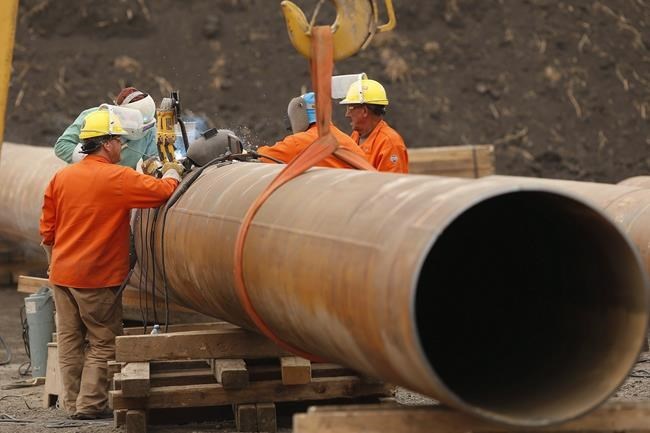CALGARY — The new CEO of pipeline giant Enbridge Inc. says regulatory uncertainty in this country has resulted in a "lost decade" for Canadian liquefied natural gas production.
Greg Ebel, who took the reins from outgoing Enbridge CEO Al Monaco last month, made the comments in an interview following the release of the company's fourth-quarter financial results.
Ebel — who was formerly the chief executive of Spectra Energy, which Enbridge acquired in Feb. 2017 — said he was in Ottawa last week speaking to cabinet ministers about the need to accelerate energy infrastructure development in this country.
He pointed out that the U.S. didn't began exporting liquefied natural gas (LNG) (LNG) until 2016. But just over eight years later, according to the U.S. Energy Information Administration, the United States now has more LNG export capacity than any other country and has exported more LNG than any other country.
U.S. LNG exports averaged 11.1 billion cubic feet per day (Bcf/d) during the first half of 2022, according to the EIA, while Canada does not yet have a single LNG export terminal in operation.
"Goodness, that’s an opportunity lost for Canada," Ebel said, adding Enbridge's pipelines currently supply natural gas to five operating LNG export facilities on the U.S. Gulf Coast.
He said the company continues to be interested in further acquisitions in the Gulf area that could accelerate its energy export strategy.
“As someone responsible for allocating both human capital and financial capital, I have to do that where it seems most welcome," he said.
"My first choice would be doing it right here in our backyard, but if that’s not possible, then we have to allocate it in different parts ... and hence that’s why you see this great production, in both infrastructure and opportunity, on the Gulf Coast."
Progress on LNG is being made here in Canada, with LNG Canada's massive LNG export terminal under construction near Kitimat, B.C., and Enbridge's own Woodfibre LNG — a partnership with Singapore's Pacific Energy Corp. — also approved.
Proponents say with Western Canada's vast reserves of natural gas, there is room to expand the country's LNG industry even more — something they say could help other parts of the world reduce their reliance on coal and address global energy security concerns.
But concerns over climate change and the coming energy transition have created an uncertain energy investment environment. Prime Minister Justin Trudeau, for example, has suggested there isn't a business case for an LNG export terminal off Canada's Atlantic coast, even though advocates have said such a facility could help wean Europe off Russian energy.
"Our G7 colleagues are crying out for energy ... they’re knocking on the door and we don’t seem to be answering," Ebel said.
Energy infrastructure projects in this country have also been plagued by cost overruns and delays in recent years. TC Energy Corp. recently revealed that the price tag for its Coastal GasLink pipeline project — which will carry natural gas across northern B.C. to the LNG Canada export terminal — has increased to $14.5 billion, up from $6.6 billion a year ago.
Last February, the Crown corporation behind the Trans Mountain pipeline expansion project — which will increase oil transportation capacity from Alberta to the West Coast — announced the new cost of the project was an estimated $21.4 billion, up from an earlier estimate of $12.6 billion.
In the case of Trans Mountain, the ballooning price tag was blamed in part on "scheduling pressures related to permitting process" as well as route changes to avoid culturally and environmentally sensitive areas.
"You need stability in permitting, and you need certainty in permitting," Ebel said, adding he believes Canadian policy-makers need to recognize that this country has a "global responsibility" to export energy to its allies.
"We seem sometimes to be focused on ourselves," Ebel said.
"We are a relatively small country from a population perspective, and a giant country from a energy production perspective. So we better figure this out.”
This report by The Canadian Press was first published Feb. 10, 2023.
Companies in this story: (TSX:ENB)
Amanda Stephenson, The Canadian Press




